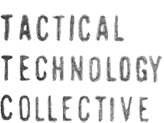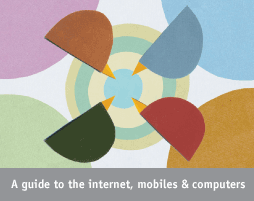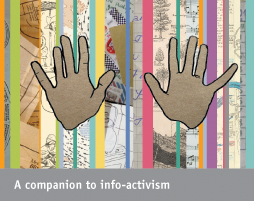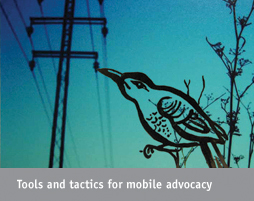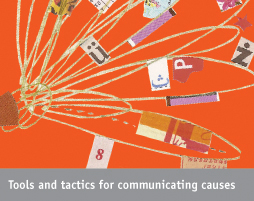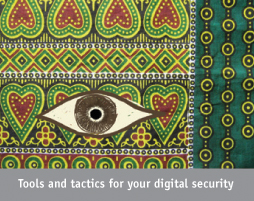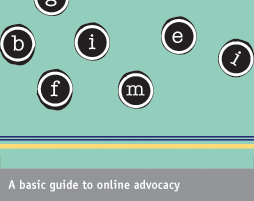IN THE LOOP | August 2012
TACTICAL TECH'S IN THE LOOP
In the Loop is our monthly experimental – not really a – newsletter which features highlights from our Twitter feeds and updates on what we've been up to at Tactical Tech.
Don't forget to follow us on Twitter @ONOrobot @drawbynumbers and @Info_Activism
August 2012
THE BACK ROOM AT TACTICAL TECH
It might be Summer in Europe, but it's been another busy month here at Tactical Tech. See our New Releases section for some of what we've produced this month (films, films, films), and have a look at what we've got to look forward to.
WHERE ARE WE GOING?
(Image by Beautiful Trouble)
TACTICAL TECH HOST BERLIN LAUNCH OF BEAUTIFUL TROUBLE
On 13th September, Tactical Tech will host the Berlin launch of the book "Beautiful Trouble: A Toolbox for Revolution" – a toolkit and history of creative protest. Co-editor/author Andrew Boyd along with local contributor Dmytri Kleiner will talk about the book followed by an open discussion of the state and future of creative activism in Berlin. Tactical Tech will also introduce the evening with an outline of their forthcoming book, on the art of using evidence in activism. Books will be sold and there will be space to mingle, have a drink and chat to others. It starts at 8pm at Saint George's Bookshop, Wortherstrasse 27, BERLIN 10405.
SENSING PLACE/PLACING SENSE II
Tactical Tech's co-founder Marek Tuszynski is speaking on 1st September as part of the Ars Electronica Festival in Linz, Austria on a panel on 'Data journalism and information activism – communicating data to the public'.
THE INTERNET AND HUMAN RIGHTS: BUILDING A FREE, OPEN AND SECURE INTERNET
Stephanie Hankey, Tactical Tech's Executive Director, is speaking on a panel on 'Civil Society Strategies for Internet Freedom : Answers from HR defenders, activists and bloggers' at a conference in Berlin on 13th September. Tactical Tech staff will also be running tech demonstrations.
OK FESTIVAL, HELSINKI 
(Image by OK Festival)
Tactical Tech staff will be attending the first-ever Open Knowledge and Data (OK) Festival. Happening in Helsinki from 17 to 22 September, it promises "a full week of participatory sessions, keynote lectures, workshops, hackathons and satellite events, organised by diverse communities from over 40 nations across the globe." The theme of the event is "Open Knowledge in Action".
NEW RELEASES
SEX WORKER VOICES: REFLECTIONS (1)
As mentioned in last month's In The Loop, Tactical Tech has been working on a collaborative project with two sex worker collectives in India and Cambodia for the last two-and-a-half years. The aim of the project was to explore how community-based organisations can use data and evidence in their advocacy. The first in a series of write-ups of the project is now up on Tactical Tech's website. It focuses specifically on one of the collectives, DMSC – a Calcutta-based forum of 65,000 sex workers -- and looks at not only what the DMSC collective did (in terms of collecting evidence for the project), but also at why the project worked, how the collective had to re-think some of its assumptions in the face of new evidence, and how this will impact their campaign activities in the future.
KEEP YOUR SITE ALIVE!
The Electronic Frontier Foundation (EFF) has launched a new guide that gives us practical advice on how to keep our websites and blogs alive in the case of a DDoS (Distributed Denial of Service) attack. In collaboration with EFF, our own Tactical Studios have produced a series of three short films, each focused on a different aspect of DDoS survival. The three films -- "Don't Let Yourself Be Silenced", "Back Up Your Web Content" and "Mirror Your Web Content" -- can all be watched here.
This month we also launched our Noir Digital Security film series. Filmed in classic film noir style, the series is made up of three short films, each focusing on a different aspect of digital security. The films also include short interviews with human rights defenders from different regions, who talk about the digital security threats they face in their countries when using computers, mobiles and online services.
TACTICAL STUDIOS AND WORLDVISION
Tactical Studios has just completed four campaign packs for World Vision's Child Health Now campaign – aimed at achieving MDG 4 for reducing child mortality. Each pack has been tailored to four different audiences and is slightly different in emphasis. They will be used to re-energise the Child Health Now campaign for a 'Global Week of Action' in November.
SPOTLIGHT
ANONYMOUS, UGANDA, LGBT RIGHTS AND QUESTIONABLE POLITICS ?
On August 14, hacktivist group Anonymous took control of Uganda's official government website. In protest against the government's treatmeant of its gay citizens, Anonymous posted photos on the site from Uganda's first ever Gay Pride week, as well as an "official apology" to gay people. LGBT activists in the country, however, have warned that Anonymous' actions may have caused more harm than good. Read their responses.
More criticism of Anonymous can be found in Angela Nagle's recent article for PressEurop, "Hacked Off with Hacktivism". Predicting and welcoming the end of the "love affair between hacker culture and the left", she examines some of Anonymous's less admirable actions: "Anonymous have long been associated with some of the nastiest, most idiotic behaviour online for years," she says.
But who are Anonymous exactly, anyway? Read Gabriella Coleman's engrossing article documenting the time she spent studying Anonymous on Internet Rely Chat networks ("five hours a day, seven days a week"!).
ACTIVISM
SEX STRIKE IN TOGO
The 'Lets Save Togo' women's collective have called for the women of Togo to go on a week-long sex strike in order to press for the resignation of the country's president and in protest against human rights violations, corruption and torture. The women say that "Togolese women are more affected by poverty. They must keep the pot boiling, feed their husband and children who, in disadvantaged communities, remain dependent on them for a long time – especially as unemployment is rampant and the price of food staples is soaring."
See the French site Collectif Sauvon le Togo and the Guardian Articleon Togo Womens Sex Strike Against Dictatorship.
UK PARALYMPICS: PROTESTS
Activists have been protesting against sponsorship of the Paralympic games by ATOS – a company involved in testing disabled people to see if they are 'fit to work'. Campaigners claim that more than 1000 people have died after being found 'fit to work' by ATOS. They have been running their own 'Atos Games' to coincide with the Paralympics.Read more here.There was speculation that British paralympians chose to hide their Atos branded badges during the opening ceremony.
CENSORSHIP IN JORDAN
The Government of Jordan has approved a draft bill which, if passed into law, will restrict internet freedom for Jordanian citizens. Jordanian bloggers and website owners called for a blackout in late August,
RESISTANCE RADIO IN MEXICO
Focusing on the use of free radio as a means of community resistance in Mexico and certain cities in the US,Wave Manual is a new "newsprint 'zine" which will be distributed in both countries. Their website documents some of the team's experiences and research.
E-BOOK: THE EUROPEAN CRISIS, ACCORDING TO BLOGGERS
Blogging community Global Voices has published its first e-book 'Europe in Crisis: Citizen Media Coverage'. A collection of the best posts from Global Voices' group of citizen-reporters around Europe, the e-book is free to download.
"HOLD YOUR HEAD AT AN ANGLE"
Don't want to be recognised by the surveillance cameras? Watch Anonymous's new how-to video on avoiding facial recognition.
PROVOCATION
WHAT MAKES A WHITE TERRORIST DIFFERENT?
#1: "White terrorists are called 'gunmen'....Other terrorists are called 'terrorists'." For numbers 2 to 10, go here.
DO ENCRYPTION TOOLS ACTUALLY WORK?
Encryption services like CryptoCat and Hushmail are not as secure as you think, says expert Patrick Ball. In this article, he tells us why, and offers us a list of key questions we should ask when assessing any security tool.
"THE ELECTRONIC EQUIVALENT OF INVISIBLE INK"
But encryption is not the only way of encoding messages. In this article from the BBC, Prof. Alan Woodward writes about the practice of embedding secret messages in apparently innocuous digital objects -- photos or travel blogs, for example.
THE NAKED AND THE TED
"TED is no longer a responsible curator of ideas 'worth spreading'," says Evgeny Morozov, once himself a speaker on the TED platform. In this article for The New Republic, he critically examines some of TED's newly-published books, criticising – in no uncertain terms -- the entire TED approach as he does so.
SURVEILLANCE AND SOCIAL RESPONSIBILITY?
Surveillance technology is by now a central part of our everyday lives – whether we know it or not. But how committed to corporate social responsibility (CSR) are the companies that sell it? Earlier this year, Privacy International set out to find out by analysing the CSR policies of many of these companies. See what they discovered, here.
THEY KNOW WHERE YOU LIVE
How much personal information do we give away on Twitter without realising it? Tweeting about being at home could land you and your address on We Know Your House. Aimed at showing us how easy it is to pinpoint our home address if we tweet about being at home with locations enabled, the website describes itself as a "social networking privacy experiment". Your information stays up for an hour before being permanently deleted.
SAFE SURFING FOR JOURNALISTS
Based on a webinar by cybersecurity and data privacy specialist Robert Guerra, the International Journalist's Network has published some important online security tips for journalists.
Very much needed, it would seem – especially in Pakistan, according to recent research conducted by Pakistani human rights organisation Bytes for All. Read about the dangers faced by Pakistani journalists.
FAKE SECURITY TOOL FROM PRO-SYRIAN GOVERNMENT HACKERS
Syrian journalists and activists also need to be particularly vigilant. The latest "offering" from pro-Syrian-government hackers is a fake security tool called AntiHacker. Claiming to provide enhanced security, the malware does the exact opposite – enabling its creators to spy on its victims. Read more here.
LOCATION, LOCATION, LOCATION
Our use of mobile electronic devices means that we are now more easily tracked than ever before. But who exactly has this information? Well, Facebook, for one. Every time you log into your account, Facebook records your location – though not very accurately, as this article in ITWorld points out.
And our mobile phone companies are tracking us too – watch Malte Spitz's TED talk on what he found out after he examined all the data his German mobile phone company had been keeping on him.
ONLINE TRACKING
Websites often use other companies or company products to track you online. Who are these companies, and which websites are using them to find out who you are and what you're doing? From 1 to 100, a list of the most-visited websites in the US, and how they're keeping track. Read more here.
TWITTER FIGHTS BACK
The social media giant has appealed a US court ruling that will force it to hand over account information about, and tweets posted by, an Occupy Wall Street protestor. Read more here.
SKYPE: THE KNOWN UNKNOWNS
Some clarification on the "how secure are we on Skype?" question.
ILLUMINATION
DATASETS FROM INDIA
From statistics on crimes against women, to graphs showing the latest inflation figures – the Open Governance India website has it all. Find the information you're looking for.
BURKAS IN BACK ALLEYS
(Image by Burqas in Back Alleys)
Read John A Sweeney's in-depth study of street art and Muslim identity in Europe "Street Art, hijab, and the Reterritorialization of Public Space":
The images included in the study have also been posted as a collection on Flickr.

(Image by Global Voices Advocacy)
YOU ARE NOT SAFE !
Don't have time to read through miles of text? Here is a handy infographic from Global Voices on keeping your online data safe.
VISUALISING ISSUES IN LEBANON
Ahead of the 2013 Lebanon elections, Vote2013.org is using infographics about the current regime (such as one showing the salaries of public officials) to persuade Lebanese citizens to vote for a new government in next year's elections.
More infographics from Lebanon include this one which documents the harrassment of women on Lebanese university campuses and this one on waste.
(Image by Movements.org and Al Jazeera)
DEFECTIONS in SYRIA
This visualisation, by Movements.org and Al Jazeera, keeps track of senior military officials, members of parliament and diplomats who have defected from Assad's regime in Syria
THE ART OF PROTEST
Posters by residents of the northwest-Syrian town of Kafr Anbel inspired Foreign Policy magazine to call the town "the creative centre of the revolt against president Bashir al-Assad". The posters – many in the form of cartoons - are aimed at a wide audience and posted on the tumblr "kafranbelposters".
In a more militarised vein, combat video tutorials -- aimed at teaching the Syrian opposition combat skills and tactics – are now available on Youtube. But what are the risks, and is any of it even legal? asks blogger Tarek Amr.
DRONES WORLDWIDE
Which countries have how many drones, and what kinds of drones do they have? The UK's Guardian newspaper has produced an infographic giving us the answers at a glance.
But don't try and access the Drones+ app for your iPhone to find out news of U.S. drone strikes in Pakistan, Yemen and Somalia – despite the fact that it doesn't show any images of the aftermath of strikes, the app was blocked from the App Store.
ARE YOU SHEEP ENOUGH?
Visit Floatingsheep.org for details of their "Sheepallenge 2012". If you like to "mix, mash, and recompose data", then this one's for you.
